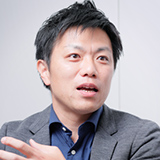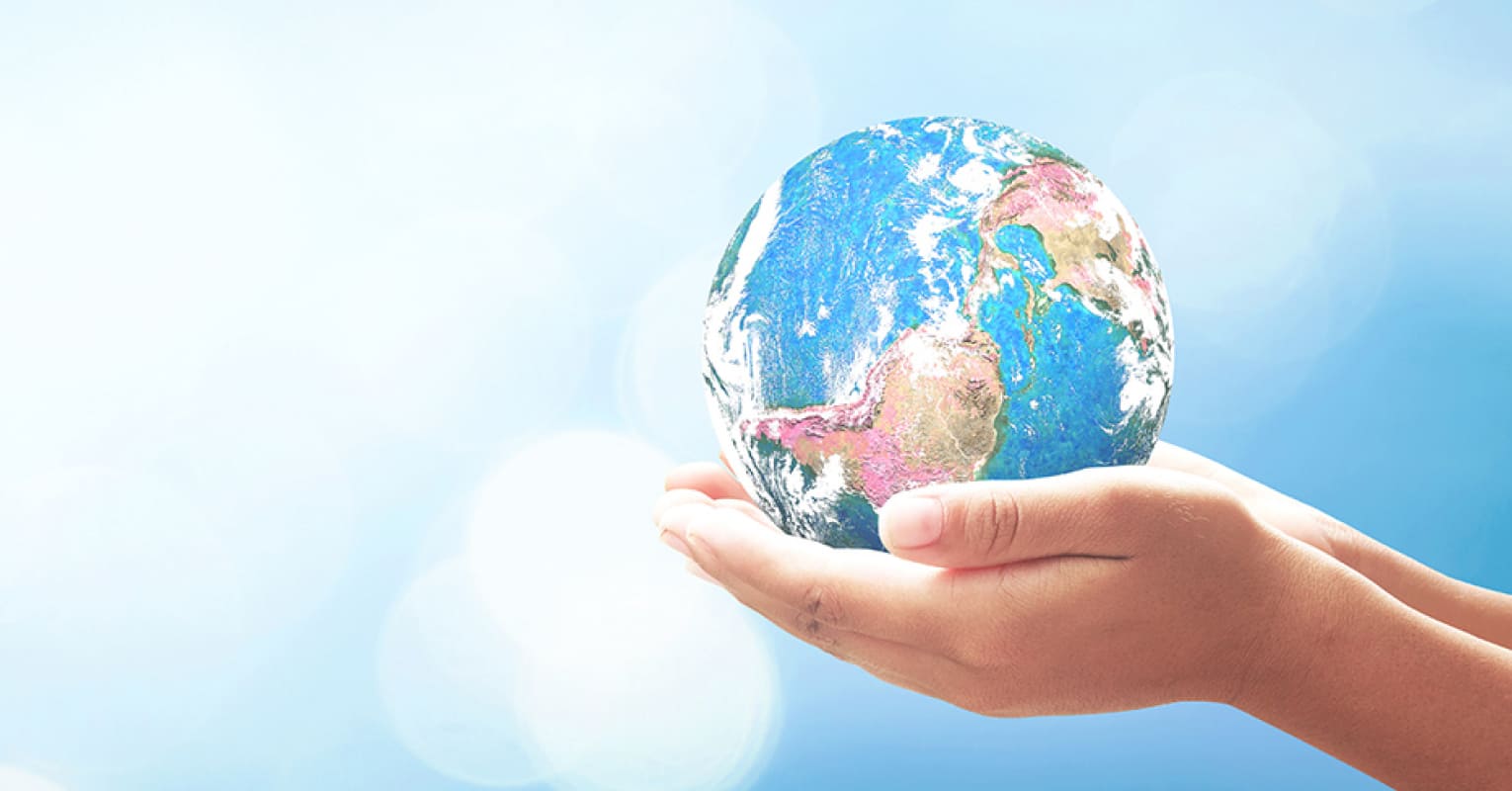
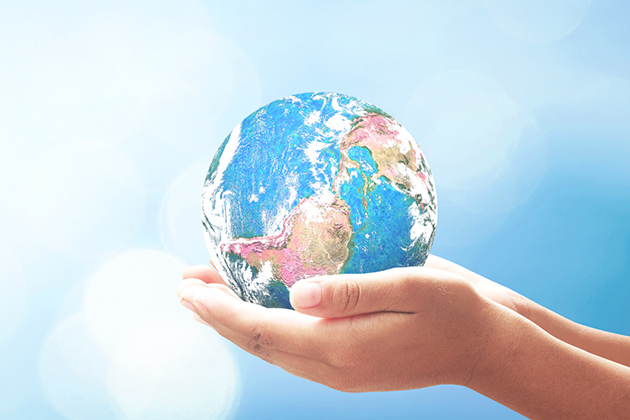
Lately, global-level issues and the UN’s 17 Sustainable Development Goals (SDGs) that indicate the goals for solving these issues have been drawing more attention. At Anderson Mōri & Tomotsune, we as legal professionals continue to look for ways to contribute to achieving these SDGs. Our lawyers have developed a wealth of SDG-related expertise in their respective fields and have put these resources at the disposal of our clients, helping them find best practice-based solutions to the many legal issues that attach to sustainable development.
In this special feature, we introduce some of the activities that have allowed our lawyers not only to commit our Firm to the UN’s SDGs, but also to position our Firm as a leader in the field of sustainability law.
For the fifth conversation in this feature series, we conduct an interview with Satoko Kono, Representative of ARUN Seed, an NPO.
*Date of the interview: May 12, 2022, conducted online.
Feature #5: Thinking through the Subject of Social Investment with Ms. Kono of ARUN Seed
(Interview with Satoko Kono, Representative of NPO ARUN Seed, conducted by Koichi Saito, Partner at AMT, and Mariko Kimoto, Associate at AMT)
Table of Contents:
Q1:Significance of social investment
SaitoThank you for sparing your busy time for us today.
Ms. KonoI also wish to express my gratitude to Mr. Saito for the varied support he has provided us with up to now. It has been some time since I last met with Ms. Kimoto.
KimotoI really admire your work. I have been looking forward to this conversation with you.
To begin, what exactly is the “social investment” made by ARUN?
Ms. KonoThere is no fixed definition of “social investment.” One commonly used nowadays is “investments made with the intention to generate a positive, measurable social and environmental impact alongside a financial return,” which is the definition of “impact investment” provided by the Global Impact Investing Network (GIIN). Needless to say, investments that generate greater capital economically are important, but social investments that simultaneously aim to generate returns on social issues such as poverty, employment, and the environment through business are equally important.
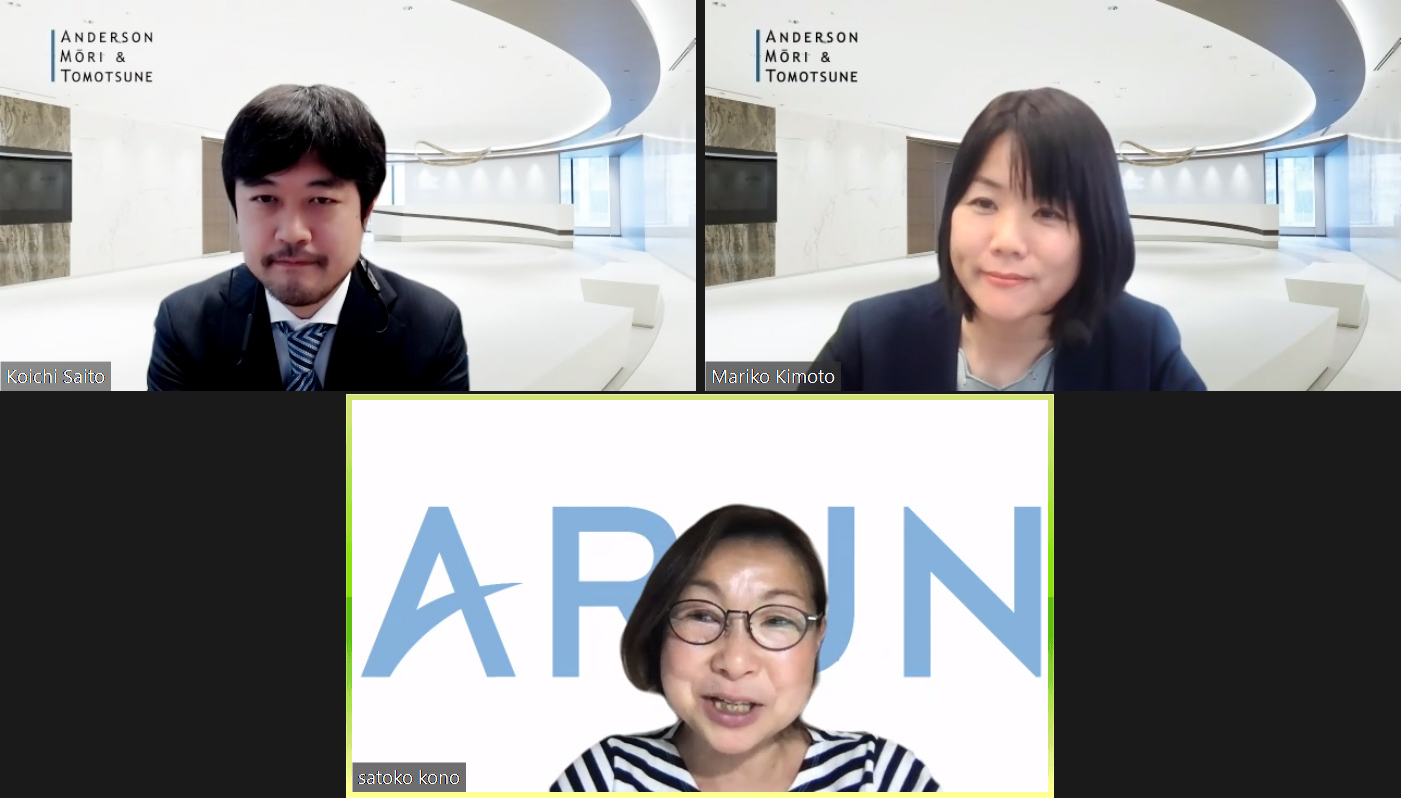
Q2:How ARUN was founded
KimotoWhat was the occasion that made you start ARUN?
Ms. KonoI lived in Cambodia for about 10 years before I started ARUN. In Cambodia, I worked with NGOs and the Japan International Cooperation Agency (JICA) to improve healthcare and to collaborate with local NGOs, and I think that my experience there had a great impact on me.
I first went to Cambodia in 1995. That was the time when the civil war had just ended and 1/3 of the people were living on less than a dollar a day. The institutional infrastructure and the physical infrastructure were destroyed, and people seemed to have little confidence in themselves. In the meantime, foreign aid has come in and Cambodia’s situation has improved, but people have become dependent on aid.
When I was skeptical about whether it is all right for the Cambodian people to continue to depend on aid, one day I met a young Cambodian social entrepreneur who started a business in a rural area. I witnessed a virtuous cycle in which farmers regained confidence through this entrepreneurial business and received fair compensation for their labor, which improved economic conditions and increased the organizational strength of the village. And I found it fascinating and hopeful that business can help the poor regain self-confidence, which becomes a driving force for people to become independent.
It is dangerous to depend on aid to continue business. If you rely on aid, you will be expected to do as planned. But real business requires the ability to adapt to changing circumstances — creativity. So, I decided to become an entrepreneur who supports these people. At that time, Europe was making such social investments in Cambodia, so I thought Japan might be able to do the same.
ARUN means dawn in Cambodian. The hope and energy of an entrepreneur to create a new society is the same as the hope and energy of starting a day. With such hope in its name, we established ARUN in 2009.
Q3:ARUN’s activities and SDGs
KimotoHow does ARUN’s vision and mission relate to the SDGs?
Ms. KonoARUN started out as a limited liability company that engages in social investment on its own. Later, we established ARUN Seed, an NPO, to promote, develop, and conduct research on social investment. While we make social investments in developing countries, we conduct surveys and research on social investments and disseminate from Japan to the world information on social investments.
Regarding the relationship between ARUN’s vision and the SDGs, I believe that the key point is the concept of “leaving no one behind,” which is stated in the preamble of the SDGs. ARUN aims to create a society where all members live and enjoy the full range of talents and abilities, regardless of background and economic status. Each of us has different talents and comes from different circumstances, but each of us is unique, and while some are perhaps luckier than others, this uniqueness is precious. In other words, another name for respect for this uniqueness is “human rights.”
The 17 goals of the SDGs cover a variety of areas, each of which represents the future in a key area. All of these are issues not only for the people in developing countries but for all of us. This is an issue of human rights, and I believe that the 17 goals are interconnected in terms of how to solve these issues.
KimotoRecently, the issue of “business and human rights” has become a hot topic. “Human rights” was rather a difficult and elusive topic for me, but your explanation made this topic more familiar and easy-to-understand. How is society responding to ARUN's activities
Ms. KonoI think it has changed for the better. In the past, the concept of balancing social impact and economic return was not well accepted. Recently, the terms “impact investment” and “ESG investment” have increasingly appeared in newspapers. In the past, investments were valued on the two axes of risk and return. Now, investments are being valued on the three axes of risk, return, and impact. It has become more understood that in order to capture the impact qualitatively and quantitatively as much as possible, the approach in investing should be based on what kind of society we are aiming to achieve when examining the target business for investment.
On the other hand, I think there are challenges that must yet be overcome in the future. Social investment invests in startups that are trying to solve social issues, in particular where there are social issues that are difficult to solve or that involve issues that must be resolved energetically, but which take time to solve. It is difficult to start a business to solve these challenging social issues because this requires the use of new technologies and much ingenuity. Sometimes efforts are not rewarding. It is necessary to finance startups to support things that do not go well and that operate in uncharted areas instead of just looking at the immediate results. I believe that this new flow of money creates a new culture that cannot be created by conventional investment ideas.
Social investment should be more responsive to social changes. Social investment and impact investment tend to be promoted as if they can achieve the SDGs, make money, and are fashionable. Yes, in order to spread social investment, we might need to offer these things, but I think a fundamental change is necessary in the mentality present in business and investment.
SaitoIn the past, the public sector was responsible for infrastructure projects, while the private sector was responsible for only profitable projects. In reality, however, there are problems that need to be solved even if they are not necessarily highly profitable. For example, the businesses of nursing and childcare for sick children are regarded as unprofitable, and there are not enough public facilities to satisfy society’s needs. I believe that the private sector, as an actor, should understand social needs and support social infrastructure. It is wonderful to support such a movement.
Ms. KonoI really think so too. Thank you for organizing it in a way that is easy to understand.
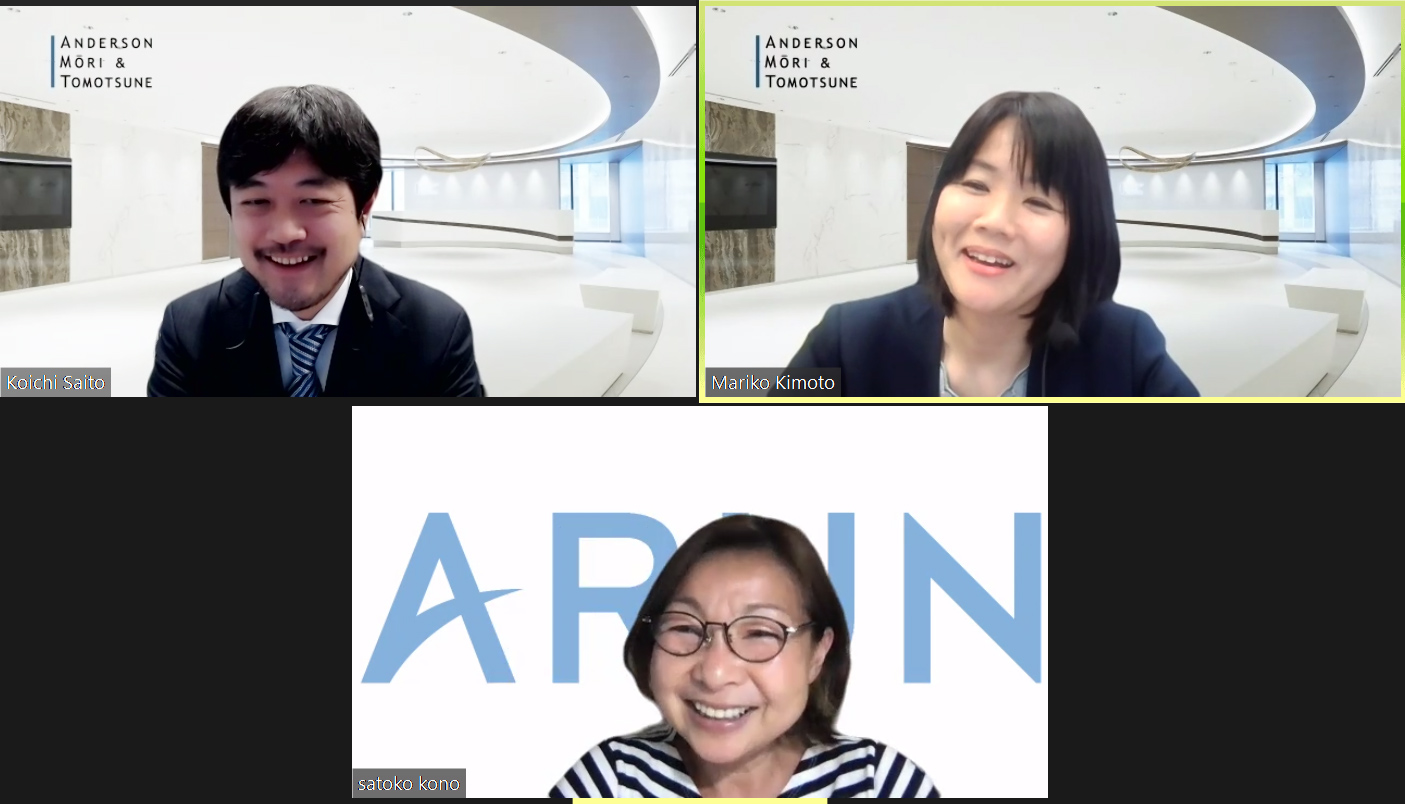
Q4:ARUN’s specific activities (1) – Investment
KimotoCould you be more specific about ARUN’s activities? Could you give us some examples of investing in social entrepreneurs in developing countries?
Ms. KonoThere are many companies, but I would like to share some examples of businesses that are trying to bring Indonesian handcrafts to the world and startups that are using the Internet of Things (IoT) to reform the dairy sector in India.
In rural Indonesia, the production and sale of traditional crafts made from natural materials are an important source of income for many people. However, even if the manufacture and sale of traditional crafts sound like an established industry, these are mostly undertaken by small businesses, and the market where they can sell their products is limited. Sales to tourists were also an important source of income, but due to COVID-19, the number of tourists decreased sharply and sales also decreased. These changes are affecting the lives and health of women, who are important players in the manufacture and sale of traditional crafts, and in turn, children.
Under these circumstances, an entrepreneur developed an app that enables small businesses to sell traditional crafts to the global market. By using this app, small businesses can now easily manage stock and sales in ways that have not been done before. It is also expected that these small businesses will gain access to logistics and financial services in the future. The use of these services will not only increase productivity, but will also allow women to take part in making decisions in the community. Three co-founders of this company are women. This is exactly the empowerment of women by women.
I believe that this business to increase income from the sale of traditional crafts in rural areas is directly linked to Goal 1 (No Poverty), Goal 5 (Gender Equality), and Goal 8 (Decent Work and Economic Growth) of the SDGs. In addition, the use of natural palm tree fibers for those traditional crafts contribute to Goal 12 (Responsible Production and Consumption). This business will increase women’s income and improve their health and nutrition. The founding members’ desire to improve the health of rural communities and the education of children is being realized. We believe that this will contribute significantly to achieving Goal 3 (Good Health and Well-being) and Goal 4 (Quality Education).
KimotoI don’t think that entrepreneurs themselves are thinking about the connection with the SDGs, but I have the impression that the SDGs have made these clear as investment criteria that help investors when they choose their investments.
Ms. KonoMany Japanese companies often take into account the number of SDGs. But as you mentioned, they do not necessarily give much regard to the number of SDGs outside of Japan.
SaitoFor example, can an app help to prevent child labor?
Ms. KonoThere are limits to what you can do with apps. For example, when I was shown a video of a village, I saw a mother weaving a basket where she was surrounded by children, which is a common sight seen in villages. We cannot really see what is actually going on there. I think that it is the investors who must act to clarify the potential issues behind the supply chain.
SaitoI see. There are difficult issues that cannot be solved by technology alone.
KimotoI think the COVID-19 particularly affected the developing countries.
Ms. KonoYes, many companies have been unable to do business due to COVID-19. For example, a company that provides human resource matching services for housework workers in India has been contributing to reducing poverty by using IT, namely, by providing an environment where female domestic workers can work with peace of mind, and by creating jobs that respect women’s human rights. Domestic workers may live-in at their place of work or commute. While live-in workers were able to continue working during the pandemic, commuters were unable to commute due to the lockdown and many lost their jobs. Entrepreneurs helped deliver food and safe water to unemployed workers. Another entrepreneur who heard about the lack of access to water for the poor who could not reach the water stations in the areas that were locked down due to COVID-19 pleaded with the government to enable the poor to have access to water as soon as possible.
Q5:ARUN’s specific activities (2) - Human resource development
KimotoMany social entrepreneurs have used their networks, their ability to act, and their flexible minds to cope with the pandemic. By the way, I heard that ARUN is holding a contest to find social entrepreneurs. What is the aim of this contest more specifically?
Ms. KonoARUN Seed as a NPO, invests the funds donated through crowdfunding and other means, and focuses on human resource development. This is why we have held the CSI (Cloud Social Investment) Challenge as a business competition with the support of JICA and other organizations. At the beginning, the CSI Challenge were held mainly in Asia, but in 2020, the third CSI Challenge was held online due to the COVID-19 crisis, and we invited entries from all over the world. Thus, there are now entrepreneurs not only from Asia but also from Africa and the Middle East participating in the event. We conduct online screening, pitch sessions and interviews, and invest in selected companies. The CSI Challenge is scheduled to be held again this year (2022).
The key perspectives taken during the screening process are: (1) the perspective of social impact, the size of the impact, the target audience, and sustainability; (2) the perspective of the business model used, business sustainability and feasibility; (3) the perspective of innovation, whether it is an original idea or technology, or whether it is an area that has never been translated into a business before; (4) the perspective of the team, whether it is committed to solving social issues, and whether it is skilled or experienced; and (5) the perspective of creativity, how it is responding to the impact of COVID-19.
Q6:Balancing Profits and Solving Social Issues
KimotoIn the case of social investment, it seems difficult to achieve both goals, that is, of economic return and solving social problems. Would you agree?
Ms. KonoYes, I have deep dilemma here. Thankfully, we were able to continue our activities due to people who support and understand us. If you look at entrepreneurs, they have people who support and understand them. It is not easy to achieve both goals, and our activities are still incomplete, but it is important to continue.
In addition, it is important to have experts in order to balance the two goals. There is a common saying that “conceive ideas like amateurs, execute them like experts”. This means that even if an idea is creative, the goal cannot be achieved if it is not accompanied by the means to execute this idea. Systems and experts are indispensable to support entrepreneurs.
KimotoAs a private person, I wonder what I can do for the future. Can a lawyer be of any help?
Ms. KonoOf course, lawyers could help in many ways.
You cannot create anything unless you keep trying, so it is important to have an environment where you can challenge the status quo. Everyone has anxieties when it comes to starting a new business. It is important to have supporters and colleagues who are willing to overcome these anxieties together. Social investment helps entrepreneurs to keep trying new things that are not usually realized as traditional businesses. Their challenges are all unprecedented. There are times when entrepreneurs have to challenge the status quo even if there is a risk. Such entrepreneurs can continue to do so because there are experts who advise them and help them work through their ideas.
SaitoI am impressed. I understand why you started promoting social investments. From the perspective of the SDGs, addressing poverty is one of the most important issues, and if we can eliminate poverty in the region through business, it will have a great impact for the better. We will continue to do our best to assist you. Thank you very much for joining us today.
KimotoWe will also do our best to help.
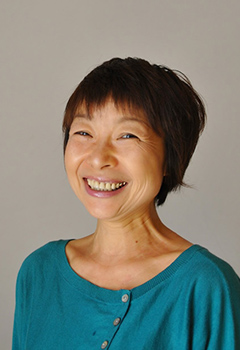
Satoko Kono
